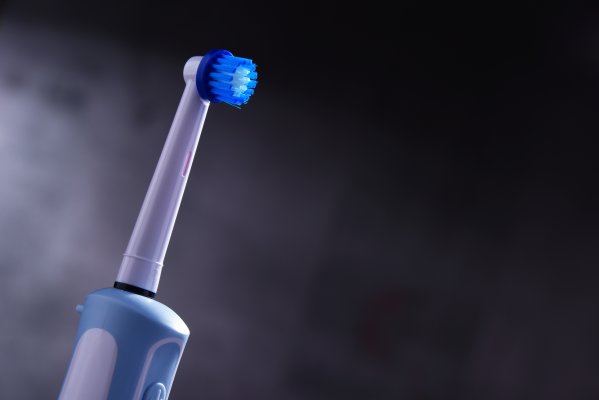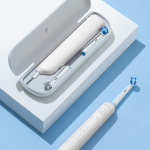Ionic toothbrushes are a new entry in the dental hygiene market. As the name implies, it uses ions or charged particles to clean the teeth, something that is not done by any electric or sonic toothbrush which are more common nowadays. The best part about the toothpaste is that it fits many users’ needs because it does not need friction or toothpaste to work. It is also highly effective in cleaning the teeth of plaque, dirt, and others.
Ionic toothbrushes work through the use of physics. After all, the concept of positive attracts negative can also be applied for the teeth. The teeth generally have a negative charge while dust and plaques have a positive charge which causes the two to stick. Ionic toothbrushes have a titanium metal inside them. This creates a closed circuit inside the mouth that converts the charge of the teeth into positive, making it repel the plague and the dirt inside it. This action, along with the saliva inside the teeth, makes it easy to get rid of the dirt inside the teeth.
Because of this, ionic toothbrushes do not need toothpaste. This is because the main role of the toothpaste is to make the brushing motion of manual brushes and electric toothbrushes smoother and safer for the surface of the teeth. Because ionic brushes mainly depend upon charged particles to attract the dirt and plaque away from the teeth, there will be no need for friction. The only part of ionic toothbrushes that needs to be regularly maintained is the brush head which needs to be replaced every three months, the same with any manual or electric toothbrush. This is to ensure that it will still be hygienic to use in the long run.
The main concern that some may have is about the safety of using the product. After all, introducing charged particles may cause some to think that there is a risk of being accidentally electrocuted when using the product. The good news is that the product uses very minimal charge to do this that is low enough as to not be felt by the user at all. There is no numbness, pain, or awkward feeling whenever using the product. This is because using too much electricity for the product makes it inefficient in cleaning the teeth anyways.
The main benefit of using a toothbrush that is not manual is that you can get more strokes per minute. After all, the human hand can only manage up to hundreds per minute at best. This is why the cleaning efficiency of ionic toothbrushes are best compared to electric toothbrushes which are capable of thousands of strokes per minute. In several lab tests conducted by credible researchers, it was found that the difference in cleaning performance between the two is not statistically significant which goes to show that both are effective in cleaning the teeth. Because of this, both products are recommended for you. At this point, user preferences and specific features are the only things that may discourage you from buying an ionic toothbrush.
As mentioned above, electric toothbrushes are the most common alternative for manual toothbrushes. These high-frequency vibrations make it possible to have thousands of strokes per minute when brushing the teeth. Aside from this, it comes with a lot of different features that makes it perfect for any specific need you have. This includes teeth whitening, cleaning for those with sensitive teeth, all-around cleaning known as 3D cleaning, and more. Popular brands for this include Sonicare and Philips which are household names already. These also come with replaceable brush heads advised to be bought every three months.
The main difference between ionic brushes and electric toothbrushes is the abundance of cleaning methods with the latter. Given that it uses friction to clean the teeth, it can be used for teeth whitening and heavy-duty cleaning which needs more force than usual in case that is what the user needs. With ionic brushes mainly relying on charged particles, this is simply not possible to be incorporated.
The main advantage of ionic brushes is that they do not need toothpaste which can greatly reduce your monthly costs. It is also good for any type of teeth sensitivity as it does not need any force to clean the teeth. It is also generally cheaper with its average price of $20.
Manual toothbrushes are the disposable ones that we need to manually brush the teeth with. These are generally more abundant and accessible for many. However, the main issue with it is that users need to dispose of the full unit every three months unlike with electric and ionic brushes which only need this for the brush head. This makes it an unhealthy product for the environment. Aside from this, its cleaning results are also widely different for all people as some may brush their teeth incorrectly, too lightly, too hard, and others.
In comparison, ionic toothbrushes are easy to use and also have reliable cleaning results. It also does not depend upon the user’s cleaning methods. Based on its users’ experiences, they also report having smoother teeth after using it. This is because all dirt and plaque is ensured to be removed with the use of ionic charges.
Another helpful part of it is that users can freely gargle even after brushing with the ionic toothbrush. This is because their enamel will not be weakened which can happen if users gargle after using an electronic or manual toothbrush.
In conclusion, ionic toothbrushes are a very good option for cleaning the teeth. It is safe to use, effective for cleaning the teeth, and is cheaper than electric toothbrushes. Its downsides are the lack of variety in cleaning methods and generally still being new in the dental hygiene market.





